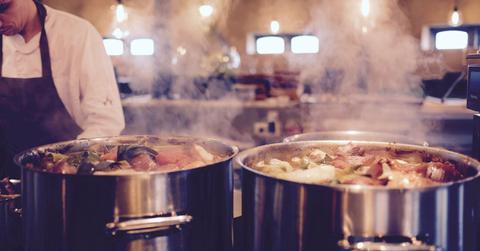This App Reduces Food Waste By Getting Leftovers To Those In Need
Food waste is a serious issue when it comes to wasting energy and water. One woman took a simple idea for eliminating that waste by doing a world of good, then turned it into a booming business.
Updated May 18 2019, 9:40 p.m. ET
Restaurants, catering companies, grocery stores, and any place that manages large amounts of food often have huge amounts of leftovers that end up in the trash. Not only is it a wasteful practice when so many people are hungry, it also creates waste that takes up room in landfills. The energy used to produce that food is also expended to no purpose, consuming water and power, but feeding no one. Fast Company reports that an app called Goodr is trying to fix the problem, and they're having amazing results.
Jasmine Crowe launched Goodr in 2017, after going viral the year before for hosting dinners for the homeless in Atlanta. Crowe says after her touch with fame, she was often asked about who contributed the food to her dinners.
"And the reality was that no restaurants donated the food. I literally was just taking volunteer donations and spending sometimes my last money to make these things happen,” she said. The situation made Crowe wonder what could be done to connect restaurants to donation opportunities. Goodr seeks to fill that gap, and manage food waste so it goes to people who can use it.
“Hunger is not a scarcity issue. There’s more than enough food. It’s actually a logistics issue,” she explains.
Goodr works by allowing clients to let the app know when they have leftover food, which is then collected by Goodr employees. They'll even pack the food up if the client prefers, and transfer it to a charity or food bank that can accept it. Everything is collected by the app, tracking the food's journey and allowing those who receive it to post testimonials. At the moment, most of the food is being brought to Atlanta Mission and Gateway Center, which focus on aiding the homeless , and National Church residences, which works with seniors in low-income housing.
Though these sorts of pick-up and drop-off services have already existed, Goodr hopes to make the technology so good that more and more people trust the service. They're testing their quality control, and collecting data on how long it takes deliveries to get from point A to point B, as well as temperature changes in the transport vans. Crow believes transparency about the service will encourage more people to use it, and make it possible for Goodr to expand beyond Atlanta to more cities in the U.S. Goodr says they've already diverted 900,000 pounds of food into meals.
It also doesn't hurt that Goodr is saving companies a lot of money! Companies are charged a fee for the service, between $2,500 and $15,000, but Crowe estimates they make $14 on every dollar they spend, because the process can be written off in tax deductions and saves on waste disposal costs. At the moment, Goodr makes $30,000 a month, but they want to get to $1 million annually to show the strength of the idea.
Crowe's already won capital from local competitions intended to boost exactly these kinds of innovations, including the United Way Spark Prize for $15,000, and $21,000 from the Miller Lite Tap the Future contest. Goodr is being recognized as the kind of project people will want to invest in, because it's invested in the community it sprang from, just like Crowe.
